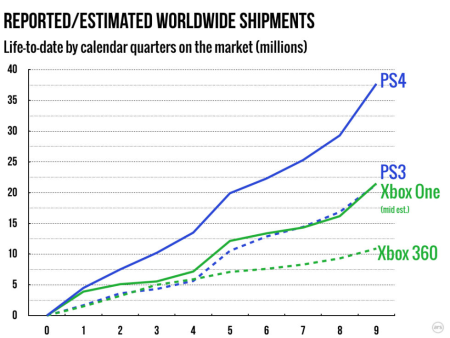Remember when the current console generation was being launched, and there was a widespread idea, also shared by me, that the PS4, Xbox One and Wii U were going to fail in the face of tablets, mobile phones, indie games, and all? That the new generation was a “prayer to stop time“?
And many articles on “Why consoles gaming is dying“, “Consoles are dying“?
And yet here we are. Ars Technica has an article comparing sales across console generations, with the current generation doing much better than the previous one, on a quarter-to-quarter basis.

I suspect that the story was that many critics, myself included, were personally jaded by console hardware, and much more interested in indie and experimental games than in the latest military shooter. But our sentiments just weren’t widely that shared. People still want new games on new hardware, even if they only look marginally better than those of the previous generation. The PS4 is slick, and the share button is worth paying for. You also buy a new console because that is where the games are going to be.
Also, cloud gaming never took off (and I suspect it won’t due to latency issues).
Yes, you can be wrong.
PS. And Super Mario Maker is also an exhilarating experience.


